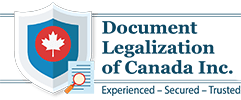Authentication and Legalization – Apostille of Canadian Commercial Documents. What are the Common Export Commercial Documents?
Canadian exporters to the international market are required to complete the authentication and legalization of Canadian commercial documents. This process requires that some of the commercial documents be stamped by Global Affairs Canada as well as the embassy for the country that the goods are destined. This process is known as document authentication and legalization, Apostille or Attestation. In other words, the Canadian Apostille Process.
Types of Export Certificates
Health or Saanitary Certificate
Health or sanitary certificates are government to government certificates that include information about the product, its health status and the consignor.
Inspection Certificate (Canadian)
Inspection certificates are developed by Canada to attest that the product complies with Canadian standards, for example certificate of origin and hygiene, product grading certificates, standard meat product certificates, etc. Consignment for countries or products with no known requirements may be issued inspection certificates, but these consignments are at commercial risk. The importer in the destination country can tell you if an inspection certificate is required.
Certificate of Free Sales
A certificate of free sales attests that, in accordance with the Safe Food for Canadians Act (SFCA) and Safe Food for Canadians Regulations (SFCR), the products are required to:
- Originate from a manufacturer licensed to produce food for sale in Canada and/or for export;
- Have been produced by a manufacturer in good regulatory standing with a food safety control plan and traceability system in place;
- And, be safe for human consumption.
The importer in the destination country is able to tell you if a certificate of free sale is required.
Radiation Certificates
The radiation certificate (Certificate of Inspection Radiation Content) is a government-to-government certificate attesting to the safe level of radiation in the exported food. Only CFIA will be issuing the radiation certificates for food exports. CFIA will issue radiation certificates when required by the importing country. The Certificate of Inspection Radiation Content will also attest that food commodities produced in Canada.
It is the responsibility of the Canadian exporter to find out from the destination country if a radiation certificate is required.
We at Document Legalization of Canada have experience in authentication and legalization of those documents for use at the importing country. Call our Toll Free number 1-833-700-5342 or email us info@legalizationdocument.ca
Legalization of Canadian documents for Use Abroad. Why Do I Need to Authenticate & Legalize my Canadian Document?
In order to validate your document to be used in a foreign country, it must be legalized at the country’s embassy where it will be used.
Legalization makes documents suitable for use in another country. To legalize a document, the competent authorities sign and stamp it. Several different and complex steps may be needed to complete the process. Most countries have standards for this. Legalization shows that:
- The document was issued by a competent and recognizable authority.
- The signature, seal and/or stamp on the document are genuine.
- The document’s format is correct.
The steps needed to have the document legalized is complex and time-consuming. Legalizing a document involves taking certain steps in a certain order.
We at Document Legalization of Canada can help you in this complex and time-consuming process. Our expert document agents have several years of experience in their fields. Rest assured that your document will be valid in the country where you intended to use it.
Feel free to reach out to our friendly staff either by email at info@legalizationdocument.ca or by calling our Toll Free number at 1-833-700-5342.





